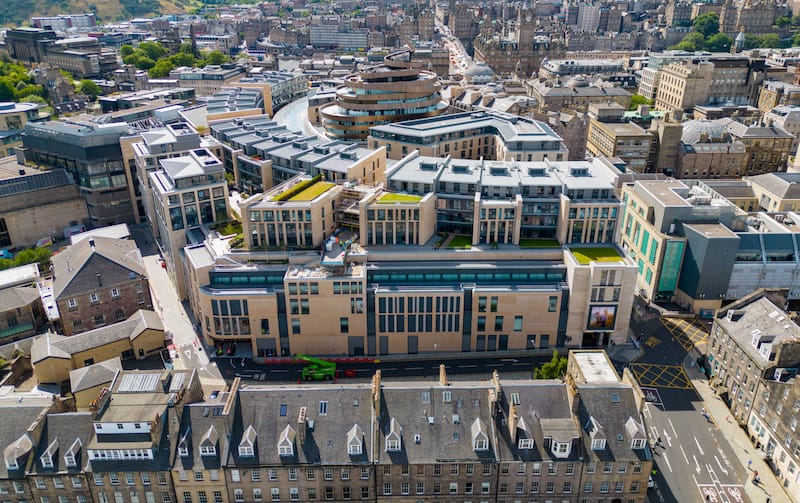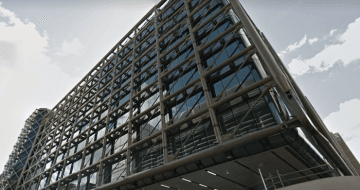CMS real estate of counsel Roland Smyth offers insight into CMS’ recent work on St James Quarter in Edinburgh, ahead of his appearance at our virtual student event tomorrow

Commercial real estate projects can be highly complex and have a big impact on businesses and the local community — St James Quarter, a high profile development located in Edinburgh’s east end, epitomises this. The end result of the redevelopment project, which has now spanned a period of over 15 years, is a mixed-use development, enhancing the city centre with its offering of retail, leisure, residential apartments, hotel, offices and aparthotel. So, what goes into the delivery of a project of this scale?
“A lot”, is the succinct response of Roland Smyth, of counsel in CMS’ Scottish real estate department, part of the CMS team working on the project. Project management has been a key strand, involving “coordination of people internally and ensuring that things happen”. The project has involved a multitude of specialist areas, including some more unusual but vital parts. As Smyth explains, “real estate often doesn’t just involve bricks and mortar — there are commonly digital and commercial pieces too”.
The project has included aspects typical within the commercial real estate sphere such as obtaining planning permission and other statutory consents, retail letting agreements, sales of residential flats and public funding aspects.
It has, however, also encompassed some unique challenges; for example, St James Quarter has its own tartan, meaning intellectual property advice was required. Additionally, pre-redevelopment, the site included various Brutalist buildings owned and leased by various third parties (Brutalism was a post-war architectural style embraced in the UK in the 1950s and 1960s). CMS were involved in a compulsory purchase process in relation to parts of the site, alongside a site assembly process, so that the titles could all be owned by the same party. Due to the project’s integrated mixed-use nature, CMS prepared a title deed which lays out the cross-rights and obligations between the various owners and occupiers of the development.
Projects spanning longer than a decade are likely to face some external issues, and St James Quarter was no exception, with both the 2007-2009 Global Financial Crisis (GFC) and related recession, and Covid-19, occurring during its development phase.
However, while the GFC and consequent recession may have seemed like an obstacle with the potential to stop the redevelopment before construction work even started, investors’ appreciation that this was a long-term project with long-term gains meant the GFC and recession did not impact the project to a significant extent. Further, knowing the client well was key — Smyth explains successful delivery of the project stemmed from “the clients and us [the lawyers] believing in the vision”. The importance of understanding clients and their aims is something CMS embraces. One of the firm’s philosophies is that their solicitors should be “part of the industries and sectors they work in rather than appear as external professionals simply advising people in them”.
However, Covid did throw up some issues due to differences in lockdown rules north and south of the border. Smyth says that while work on construction sites was allowed to continue during lockdown in England, work was shut down in Scotland. This meant many tradespeople moved south for work. Consequently, lower availability of suitably skilled construction workers in Scotland created an extra layer of difficultly for those involved in managing the St James Quarter project.
For students interested in pursuing a career in commercial real estate, Smyth advises that key qualities include enthusiasm and the willingness to be flexible and open to expanding horizons. He explains that within a project such as St James Quarter, which is large and technically complex, there were several occasions where he found himself facing new challenges. Therefore, it is important to be willing to adapt and learn new skills.
When asked what he would say to students interested in qualifying in both Scotland and England, Smyth’s advice is to engage at an early stage at university with the opportunities provided by law firms. He acknowledges the difficulty for some students in deciding which field of law they want to specialise in — so training at a large firm like CMS where you have the opportunity to work in a number of specialist seats, and possibly also a secondment seat, during your traineeship can be helpful. The main route to a training contract at CMS is through the CMS Academy, which is an award-winning summer vacation scheme. CMS also offer an insight week for those at the start of their university journey. Therefore, it is really important that students are aware of the opportunities available at firms so that they can make use of these.
Roland Smyth will be speaking at ‘Delivering a world class commercial real estate project — with CMS’, a virtual student event taking place tomorrow, Wednesday 28 September. Apply for one of the final few places.
About Legal Cheek Careers posts.


